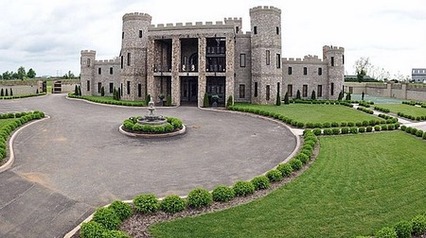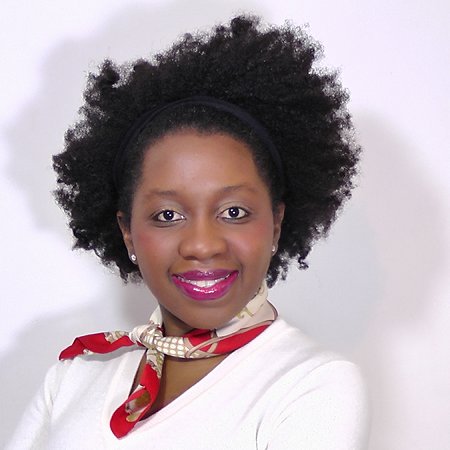 This is one of my favourite stories that my mum tells me. She'll probably kill me for writing it on paper but for me it's a very pleasant story and one that can be used to motivate other women. Certainly, it motivates me and I admire my mother all the more for how smart she is. She's very, very clever. This is how it went. Back in the 1980s my dad brought my mum to the UK for holiday. He bought her air ticket but he didn't give her any spending money, he said he didn't have any and that she would have to sort herself out. From her salary she had saved GBP100, that is all she had, that was her life savings at the time, she was in her mid-20s or just beyond. I believe this was her first trip to the UK. When she got there she observed a completely different way of life. She loved the clothes that were offered for sale and had one pivotal experience on that trip. She saw a woman buy one dress, just a single outfit, for GBP60 and she felt more envious than she had ever been before. In her words, "Ndinasilira ngati sindinasilirepo." All she could afford was second hand clothing from charity shops and car boot sales. She said that she couldn't imagine a world in which she could afford such an existence - a world in which she herself could pay that much for just one suit. This was 60% of her life savings don't forget. When she got back home she decided she needed to do more to improve her life and the life of her children. Unbeknown to my father she had observed that he didn't actually buy the air tickets for their trip; he had taken them on credit with an agreement to repay over time so she did exactly the same thing. She went to the travel agent and asked to buy one air ticket on credit with a pre-agreed schedule of when she would pay for it. She was a civil servant even then so she went to work and asked for a loan which she planned to use for shopping. She went home and announced that she was off to the UK to my very surprised father. How?! She explained. In that moment my mum gained financial independence. She went off to the UK where she bought things that she thought she could sell. She expected to recoup the money for the air ticket and the loan over a period of about three months but she repaid both in just one month. With the profits she did the same thing and indeed, for as long as I can remember my mum has used her holiday days to operate a business, not to relax. I told my mum that a Malawi in which a woman could do that was in a very different time and place. Nowadays it's so hard to navigate the system but she disagreed. My mother thinks people just have misplaced priorities. For instance she initiated someone she knew into a business and this woman used almost all of her first profits to buy a large TV and sofa set instead of reinvesting that money into her business. If you take a very long term view and operate a business with such a view you can achieve so much. Ignore the naysayers and be an inspiration to your own children like my mother was and is to me - she is my model for hard work. "Financial peace isn't the acquisition of stuff. It's learning to live on less than you make, so you can give money back and have money to invest. You can't win until you do this." Dave Ramsey
0 Comments
 Understanding different types of loans can help you to negotiate with your banker like a pro! If you can get your head around different financial concepts you can not only push your personal financial situation forward but your business life too. Let's chat about different types of loans or mortgages. All the below concepts are equally applicable to regular loans and mortgage-style loans. Fixed vs. floating (or variable) interest When you borrow money from a bank the interest rate is either fixed or it's variable, also known as floating. Fixed Interest Rates If the interest rate is fixed then it does not change for a certain duration of time; it can either be fixed for the full term of the loan or mortgage or for just part of the term. For example, you might have a 10-year loan with a fixed rate of interest for all ten years or a fixed rate of interest for the first two years only followed by a variable interest rate after those two years. Floating or Variable Interest Rates When the interest rate on a loan is variable it is reset periodically. It might be reset every month, quarterly, every six months or even annually. A variable loan is more risky for the borrower but it is less risky for the bank. It's more risky for the borrower because when you take out the loan you only know what the interest rate is in the initial period but you have no idea whether it will go up or down whenever it is reset. Why would anyone choose a variable interest rate then? Because variable rate loans are less risky for banks they are usually cheaper than the equivalent fixed rate that you can get at the same time. If your interest rate is fixed but interest rates in the economy start falling then you lose out. However, the opposite is also true, if interest rates are rising but you have a fixed rate then you're safe. Interest-only Loans You can get a loan or mortgage whereby you pay just the interest on a monthly basis and you only repay the entire borrowed amount at the end of the loan term. This may make sense if your money is locked up in an investment and you expect to receive a lump sum of money in the future. An alternative would be a loan with an initial discounted rate or a period of non-payment. How would that work? Discounted Rate Periods A loan can be structured such that you pay a low rate for an initial pre-agreed period followed by a higher rate after the discounted period is over. If you have a solid business or investment case you might even be able to secure a loan where you repay nothing at all initially (maybe a year or two) followed by a period during which the loan is repaid including interest. This is how it might work: Let's say you or you and your family own some properties but you don't want to sell them to finance a project - let's say it's a project to build flats that will take two years. You can go to your bank and use your existing assets as collateral but explain that until your project to build new flats has been finished your cash flow is restricted. The bank, considering you to be a good risk especially with your collateral, might then consider a discounted interest rate for two years or a period where you pay interest only or even a period where no payments at all are made. You can also do this on a much smaller scale. Let's say you want to go to Dubai to buy a minibus or two for business. You can explain this to your bank to get just 3 to 6 months of discounted interest payments. The more fluent you are in finance the better able you will be to negotiate. Next week I'll tell you how my mum used her understanding of finance and credit as a young 20-something year old to start a business. "An investment in knowledge pays the best interest." Benjamin Franklin  So, you're considering getting a mortgage and you want to see your banker with a firm understanding of what a mortgage is and how it works. Good. I'll sort you out with that knowledge. A mortgage is a type of loan. It's a loan for a piece of land or a property. The land or property acts as "security" or "collateral" for the loan. The asset backing up a mortgage is what makes a mortgage different to a regular, "unsecured" loan. A mortgage for a home is called a "residential mortgage"; a mortgage for offices, factories and other commercial properties is called a commercial mortgage. The "term" or "maturity" of the mortgage is the number of years over which you are borrowing the money. At the end of the mortgage term it will have been fully paid off. Your mortgage has a "principal value". The principal value is the amount of the mortgage. It's the amount that you borrow. Typically, the principal value will be lower than the value of the land or property. A bank is generally very unwilling to lend you an amount equal to the value of the property because if the property falls in value and you stop making your mortgage payments they will lose out. That is too risky for them. If you find a piece of land or property with a value of 100,000 and the bank decided it could lend you 75,000 to get that property then the "loan-to-value" would be 75%. This concept of loan-to-value (LTV) is an important one and a key mortgage term. The higher the loan relative to the value of the house, the higher the interest you will pay for that mortgage. Interest is the cost of a mortgage. However, note that the interest on a mortgage is "amortised" or paid down over the whole mortgage term. If you got a regular, unsecured loan of 100,000 and you were told the interest was 5% all you would need to calculate your interest payments for each year is the following formula: 100,000 * 5% = 5,000 This formula does not work for mortgage calculations. In order to find out your monthly payments you need more inputs. I will give you the inputs you need for the formula you can use in Microsoft excel to calculate monthly payments: Inputs required to calculate a mortgage: The value or principal of the mortgage, let's assume 100,000 for this example; The monthly interest, e.g. if you're told the annual interest rate is 12% then the monthly interest rate is 1% (12% divided by 12 months); The term in months - so if your mortgage term is 10 years that comes up to 120 months. For example purposes I will use the above numbers. · Monthly interest = 1% · Term = 120 months · Principal = 100,000 The function you will use in Microsoft excel is called PMT. The formula is: “=PMT(monthly interest, principal, term in months)” To calculate your monthly mortgage payment click any box in your excel spreadsheet, type exactly: =PMT(1%,120,100000,0) Don't type any spaces after the commas. You should get the answer 1,435. The "0" after the last comma basically says when 120 months have passed I want the value of the mortgage to be "zero" as is typically the case in a mortgage. Click to download my free mortgage calculator. If you don't have a computer at home then use the one at work. This is a very simple and basic formula but it will give you the confidence to go to your bank manager to talk about mortgages. Note that you can only use the PMT function if your interest is "fixed" - next week we'll talk about different types of interest: fixed, floating, discounted and so on. “More than anything else, what differentiates people who live up to their potential from those who don’t is a willingness to look at themselves and others objectively.” Ray Dalio (net worth $6.5bn)  Have you ever thought about getting a mortgage to kick-start your property portfolio? There are many young, professional girls in town that are planning on building a property either to live in or to rent out but they're not sure about how to finance it. Borrow the money. Get a mortgage. First things first, what is a mortgage? A mortgage is a type of loan. Due to inflation and high interest rates in Malawi it's normally just five to ten years whereas personal mortgages in the West are 25 years long on average. They can even be as long as 35 years. If interest rates are too high for you to get a mortgage then consider getting a short-term loan. How does a mortgage work? You go to the bank and borrow a given amount of money for a given number of years. Every month, you make a payment to your bank to pay down the loan. Part of the payment pays down the loan and part of it is interest. In the first few years, most of the payment is interest and only a small portion pays down the borrowed amount, however, with every payment the interest portion falls and the repayment portion increases. Getting a mortgage can help to speed up a building project. Instead of funding a project with your salary you can use your salary to pay off the mortgage and the lump-sum mortgage to accelerate work. If interest rates are too high for you to get a mortgage then consider getting a short-term loan. In fact, I myself have used short-term loans to increase the rate at which my house was built. Each time we were running low on cash we obtained a 3-month or 6-month loan to ensure that the project didn't come to a halt. What will you need to get a mortgage? Generally, the bank will want collateral: you need to have an asset that is worth more than the amount you are borrowing to secure against the mortgage. That way, if you can't pay the loan back, the bank sells your asset and recoups its money. Banks are not in the business of taking risk. They do not want to make loans that they won't get back. Collateral is what makes a mortgage different to a regular loan. Regular loans don't have a specific asset as security. What if you don't have any collateral? If a parent or other relative is willing to guarantee your loan using their property then try to get a mortgage that way. If you already have the plot of land to build on then that will have a value. Get the land valued and get a loan that is worth less than the value of the land. Use all the money to start your housing project and pay the loan back from your salary. When that loan is fully paid off your land will be worth more because you've built something on it so you can get a second, higher value loan and so on. How about if you don't have a single parent or relative that can act as a guarantor for a mortgage? Use your business's credit worthiness. If you have a business that is producing consistent revenue or even has assets then you can use your business's track record to obtain a loan. This is how my father obtained a mortgage as a young man in the 1980s. Don’t have a business? Start one! It’s never too late. “How many millionaires do you know who have become wealthy by investing in savings accounts? I rest my case.” Robert G. Allen |
For 2 years until early 2014 I wrote a weekly personal finance and business column for Malawi's leading media house, The Times Group. The target is middle-class, working African women.
This is a reproduction of the articles that appeared in the weekend edition of Malawi News. Categories
All
Archives
May 2014
|
Heather Katsonga-Woodward, a massive personal finance fanatic.
** All views expressed are my own and not those of any employer, past or present. ** Please get professional advice before re-arranging your personal finances.




 RSS Feed
RSS Feed



